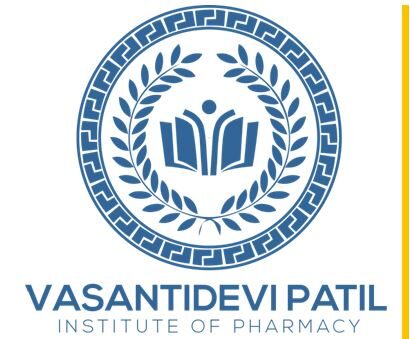Vasantidevi Patil Institute of Pharmacy

Pharmacy Career Opportunities
Pharmacy is the clinical health science that links medical science with chemistry and it is charged with the discovery, production, disposal, safe and effective use, and control of medications and drugs. The practice of pharmacy requires excellent knowledge of drugs, their mechanism of action, side effects, interactions, mobility and toxicity. At the same time, it requires knowledge of treatment and understanding of the pathological process. Some specialties of pharmacists, such as that of clinical pharmacists, require other skills, e.g. knowledge about the acquisition and evaluation of physical and laboratory data.
The scope of pharmacy practice includes more traditional roles such as compounding and dispensing of medications, and it also includes more modern services related to health care, including clinical services, reviewing medications for safety and efficacy, and providing drug information. Pharmacists, therefore, are the experts on drug therapy and are the primary health professionals who optimize the use of medication for the benefit of the patients.
An establishment in which pharmacy (in the first sense) is practiced is called a pharmacy (this term is more common in the United States) or a chemist’s (which is more common in Great Britain, though pharmacy is also used). In the United States and Canada, drugstores commonly sell medicines, as well as miscellaneous items such as confectionery, cosmetics, office supplies, toys, hair care products and magazines, and occasionally refreshments and groceries.
In its investigation of herbal and chemical ingredients, the work of the apothecary may be regarded as a precursor of the modern sciences of chemistry and pharmacology, prior to the formulation of the scientific method
Community Pharmacy
A pharmacy (also known as a chemist in Australia, New Zealand and the British Isles; or drugstore in North America; retail pharmacy in industry terminology; or apothecary, historically) is where most pharmacists practice the profession of pharmacy. It is the community pharmacy in which the dichotomy of the profession exists; health professionals who are also retailers. Community pharmacies usually consist of a retail storefront with a dispensary, where medications are stored and dispensed. According to Sharif Kaf al-Ghazal, the opening of the first drugstores are recorded by Muslim pharmacists in Baghdad in 754 AD.

Hospital Pharmacy
Hospital pharmacies can often be found within the premises of the hospital. Hospital pharmacies usually stock a larger range of medications, including more specialized medications, than would be feasible in the community setting. Most hospital medications are unit-dose, or a single dose of medicine. Hospital pharmacists and trained pharmacy technicians compound sterile products for patients including total parenteral nutrition (TPN), and other medications are given intravenously. That is a complex process that requires adequate training of personnel, quality assurance of products, and adequate facilities.
Several hospital pharmacies have decided to outsource high-risk preparations and some other compounding functions to companies who specialize in compounding. The high cost of medications and drug-related technology and the potential impact of medications and pharmacy services on patient-care outcomes and patient safety require hospital pharmacies to perform at the highest level possible.
Clinical Pharmacy
Pharmacists provide direct patient care services that optimize the use of medication and promotes health, wellness, and disease prevention. Clinical pharmacists care for patients in all health care settings, but the clinical pharmacy movement initially began inside hospitals and clinics. Clinical pharmacists often collaborate with physicians and other healthcare professionals to improve pharmaceutical care. Clinical pharmacists are now an integral part of the interdisciplinary approach to patient care. They often participate in patient care rounds for drug product selection. In the UK clinical pharmacists can also prescribe some medications for patients on the NHS or privately, after completing a non-medical prescribers course to become an Independent Prescriber.


Ambulatory Care Pharmacy
Since the emergence of modern clinical pharmacy, ambulatory care pharmacy practice has emerged as a unique pharmacy practice setting. Ambulatory care pharmacy is based primarily on pharmacotherapy services that a pharmacist provides in a clinic. Pharmacists in this setting often do not dispense drugs, but rather see patients in-office visits to manage chronic disease states.
In the U.S. federal health care system (including the VA, the Indian Health Service, and NIH) ambulatory care pharmacists are given full independent prescribing authority. In some states, such North Carolina and New Mexico, these pharmacist clinicians are given collaborative prescriptive and diagnostic authority. In 2011 the board of Pharmaceutical Specialties approved ambulatory care pharmacy practice as a separate board certification. The official designation for pharmacists who pass the ambulatory care pharmacy specialty certification exam will be Board Certified Ambulatory Care Pharmacist and these pharmacists will carry the initials BCACP.
Compounding /Industrial Pharmacy
Compounding involves preparing drugs in forms that are different from the generic prescription standard. This may include altering the strength, ingredients, or dosage form. Compounding is a way to create custom drugs for patients who may not be able to take the medication in its standard form, such as due to an allergy or difficulty swallowing. Compounding is necessary for these patients to still be able to properly get the prescriptions they need.
One area of compounding is preparing drugs in new dosage forms. For example, if a drug manufacturer only provides a drug as a tablet, a compounding pharmacist might make a medicated lollipop that contains the drug. Patients who have difficulty swallowing the tablet may prefer to suck the medicated lollipop instead.
Another form of compounding is by mixing different strengths (g, mg, mcg) of capsules or tablets to yield the desired amount of medication indicated by the physician, physician assistant, nurse practitioner, or clinical pharmacist practitioner. This form of compounding is found at community or hospital pharmacies or in-home administration therapy.
Compounding pharmacies specialize in compounding, although many also dispense the same non-compounded drugs that patients can obtain from community pharmacies.


Consultant Pharmacy
Consultant pharmacy practice focuses more on medication regimen review (i.e. “cognitive services”) than on actual dispensing of drugs. Consultant pharmacists most typically work in nursing homes, but are increasingly branching into other institutions and non-institutional settings.Traditionally[where?] consultant pharmacists were usually independent business owners, though in the United States many now work for a large pharmacy management company such as Omnicare, Kindred Healthcare or PharMerica. This trend may be gradually reversing[citation needed] as consultant pharmacists begin to work directly with patients, primarily because many elderly people are now taking numerous medications but continue to live outside of institutional settings. Some community pharmacies employ consultant pharmacists and/or provide consulting services.
Compounding /Industrial Pharmacy
Compounding involves preparing drugs in forms that are different from the generic prescription standard. This may include altering the strength, ingredients, or dosage form. Compounding is a way to create custom drugs for patients who may not be able to take the medication in its standard form, such as due to an allergy or difficulty swallowing. Compounding is necessary for these patients to still be able to properly get the prescriptions they need.
One area of compounding is preparing drugs in new dosage forms. For example, if a drug manufacturer only provides a drug as a tablet, a compounding pharmacist might make a medicated lollipop that contains the drug. Patients who have difficulty swallowing the tablet may prefer to suck the medicated lollipop instead.
Another form of compounding is by mixing different strengths (g, mg, mcg) of capsules or tablets to yield the desired amount of medication indicated by the physician, physician assistant, nurse practitioner, or clinical pharmacist practitioner. This form of compounding is found at community or hospital pharmacies or in-home administration therapy.
Compounding pharmacies specialize in compounding, although many also dispense the same non-compounded drugs that patients can obtain from community pharmacies.


Veterinary Pharmacy
Veterinary pharmacies, sometimes called animal pharmacies, may fall in the category of hospital pharmacy, retail pharmacy or mail-order pharmacy. Veterinary pharmacies stock different varieties and different strengths of medications to fulfill the pharmaceutical needs of animals. Because the needs of animals, as well as the regulations on veterinary medicine, are often very different from those related to people, in some jurisdictions veterinary pharmacy may be kept separate from regular pharmacies.
Nuclear Pharmacy
Nuclear pharmacy focuses on preparing radioactive materials for diagnostic tests and for treating certain diseases. Nuclear pharmacists undergo additional training specific to handling radioactive materials, and unlike in community and hospital pharmacies, nuclear pharmacists typically do not interact directly with patients.


Veterinary Pharmacy
Veterinary pharmacies, sometimes called animal pharmacies, may fall in the category of hospital pharmacy, retail pharmacy or mail-order pharmacy. Veterinary pharmacies stock different varieties and different strengths of medications to fulfill the pharmaceutical needs of animals. Because the needs of animals, as well as the regulations on veterinary medicine, are often very different from those related to people, in some jurisdictions veterinary pharmacy may be kept separate from regular pharmacies.
